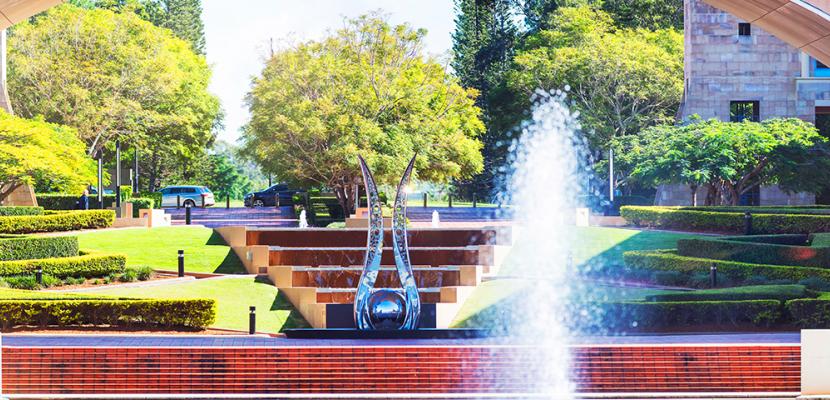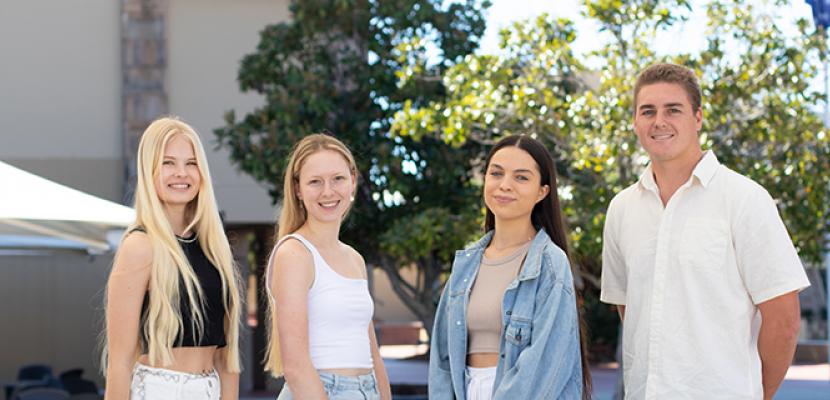
Transformation CoLab Program Manager Rose Walker, Deputy Vice Chancellor (Academic) Keitha Dunstan, and Associate Dean of Learning and Teaching, Professor Jeff Brand reflect on the first year of Bond’s Transformation degrees.
In January 2020, a cohort of adventurous students put their faith into a bold new approach to tertiary education. They became the first intake of Transformation CoLab students - our next generation of Bond Pioneers.
Introducing the Transformation CoLab
The Transformation CoLab offers a set of new and unique degrees that were developed around the occasion of Bond’s 30th anniversary. In consultation with industry and with a specific focus on work readiness, employability, and innovation, we were able to redefine our graduate attributes (capable individuals, effective collaborators, and global citizens) and design four new Transformation degrees: the Bachelor of Digital Transformation, Entrepreneurial Transformation, Health Transformation, and Legal Transformation. These degrees sit within the Transformation CoLab, a virtual space that breaks down traditional silos between Faculties and includes industry and the community as active partners in our students’ education through curriculum design and providing immersive industry experiences.
Oops, something went wrong.
Responding to a brave new world
The world we live in today is vastly different from the world that our first students experienced over thirty years ago at the start of the university. The internet, smartphones, renewable energy systems, electric vehicles, and Artificial Intelligence are not an uncommon part of daily life. On top of these technological changes, our world has become simultaneously smaller and larger through our shared experience of the past six months. As our community draws inwards with restricted travel and closed borders, we are simultaneously looking outwards by interacting with our counterparts on the other side of the world who are experiencing a similarly changed world. Being able to connect virtually is more critical than ever.
With hindsight, the new programs are even more fit for purpose than we had imagined.
While the decision to create a virtual CoLab (instead of a physical one) was made well before the COVID-19 disruption, the value of this approach to drive innovation has been validated. The CoLab is not constrained by the limitations typically imposed by Faculties with their physical spaces and hierarchical organisational structures. Our CoLab provides a virtual space or laboratory that scaffolds cognition, cooperation, communication, and, ultimately, collaboration. It is a way of doing things that permeates the whole University, and our stakeholders. It allows us to focus on technologies that bring our students closer to experts from a range of industries and locations – an approach that makes more sense in the post-COVID era. Being unfettered by the limitations of a physical location encourages vision without boundaries to harness our students’ potential without preconceptions about what they can achieve and with whom they can engage. As we pivoted from on-campus delivery to remote delivery in our May semester, our well-developed use of virtual meeting tools and online group decision-making environments supported a seamless transition.
COVID-19 and the terrible bushfire season that ravaged our country have shown us that there is little doubt that sustainability is going to be one of the most critical drivers of this next decade. After seeing the devastating effects of climate change earlier this year, we have witnessed our skies clear for the first time in decades and have seen what can happen when life slows down. We want to harness this momentum, and for everything we do in the CoLab to reflect on the UN Sustainable Development Goals. This starts within Bond with an immersion program commencing in September that will see our CoLab students heading a review of sustainability in preparation for the Queensland government’s goal to become single-use plastic-free in 2021.
Defining transformation
We hear a lot about the fourth industrial revolution, but what we need are graduates who can problem solve, adapt, collaborate, lead, create and innovate in multiple industries and roles through a lens of continuous technological advances. Students who graduate from our Transformation CoLab will be disruptors in their fields, in a society that can be entirely disrupted itself without notice. They will transform industries and communities and work across disciplines and specialties to help themselves, and others, better understand the world around them.
Our approach is transformative also in the sense that all of our Transformation programs are transdisciplinary, meaning, they don’t sit within any one faculty.
For many years at Bond, we have known that the traditional dichotomy between STEM disciplines and humanities is, at best, unhelpful. When our students leave, regardless of the industry they are walking into, they will need to be specialists in both content and technology that will inevitably be changing frequently. A geneticist who has little understanding of the ethical uses of the technologies they surround themselves with, will not thrive. Neither will a lawyer who struggles to understand how Artificial Intelligence is likely to turn the industry on its head. Our students graduate as life-long learners who can think critically and adjust and grow while the world advances around them.
For almost ten years, our undergraduate students have been required to study critical thinking and communication, leadership and collaboration, and responsibility, integrity, and civic discourse, across three core units. The Transformation CoLab takes this approach to the next level. Students study subjects specially co-designed and taught by teachers from different disciplines who bring rich perspectives to complicated contemporary issues, such as the ethics surrounding the marketing of self-driving cars and our roles as global citizens in stimulating the world around us.

The Transformation CoLab student
We are already finding that our Transformation programs appeal to two different types of students. Firstly, we have the traditionally high-achieving adventurers (usually school leavers). Secondly, we have students who have not necessarily slotted into the typical learn, churn, and earn way of doing things. They might have had a curvy road to get here, but once they have, they have thrived. Together, these students have worked together to create a small supportive community that has made the transition to university, during COVID-19 no less, a very positive experience. We have no doubt that these students will be incredible mentors for our future CoLabs.
Bond CoLabs want to change the world, and they want to change it tomorrow. It is an incredible privilege watching them as they take these first steps. Watch this space.
Transformation CoLab
Dive into more detail on Bond's game-changing Transformation degrees.